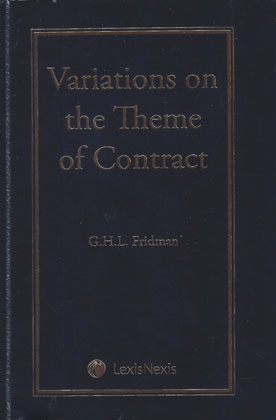
Professor Gerald Fridman was an internationally recognized expert in the law of contracts. Completed posthumously by Professor Rick Bigwood, Variations on the Theme of Contract is an authoritative, engaging text that offers Professor Fridman’s final thoughts on this complex, sometimes confusing, area of law.
Professor Fridman adopted a unique and creative structure for this publication, which consists of a number of independent essays that address various aspects of the law of contract. The collection of essays is divided into a “Prelude” followed by 14 ”Variations,” each of which is introduced by an epigraph from a Stephen Sondheim musical – a nod to the late author’s love of musical theatre.
As Professor Fridman explains in the book’s opening “Prelude,” his “intention in presenting these essays is not to, as it were, tear the law of contract to pieces. Rather, it is to draw attention to developments that merit a critical appreciation.” To that end, Professor Fridman provides a close examination of the evolution and current state of key topics related to contract law, including the freedom of contract, consideration, privity, estoppel, misrepresentation, mistake, interpretation, contractual terms, performance, frustration and unjust enrichment. Throughout, he encourages readers to delve deeper into the subject matter as he fulfills his purpose – “to inform, educate and stimulate thought about the issues that have been raised, and, perhaps, at the same time, to provide some entertaining reading matter.”
The late Professor Emeritus Gerald Fridman, Q.C., F.R.S.C., M.A., B.C.L., LL.M., Hon. D.C.L., was one of Canada’s most respected and influential legal scholars, and a prolific author of more than a dozen legal texts and more than 100 articles, major papers, case notes and book reviews. He was renowned in the fields of contracts, agency, torts, sale of goods and restitution. His work has been cited in more than 50 decisions of the Supreme Court of Canada and in hundreds of lower-court decisions. Professor Fridman studied law at St. John’s College in Oxford, and he held a B.A., B.C.L. and M.A. from the University of Oxford and a Master of Laws from the University of Adelaide in South Australia.
Rick Bigwood, LL.B. (Hons.), Ph.D., LL.D. is a Professor in the T.C. Beirne School of Law at the University of Queensland, Australia. He has also held academic positions at Bond University (2011–2015) and the University of Auckland (1995–2010). Before that, he was a Senior Solicitor with the Australian Attorney-General’s Department in Canberra. He holds an LL.B. (Hons.) and a Doctor of Laws (LL.D.) from the University of Auckland, and a Ph.D. from the Australian National University. He publishes mainly in the area of contract law, including co-authoring, with Nick Seddon, the tenth and eleventh editions of Cheshire and Fifoot Law of Contract for LexisNexis in Australia. He teaches both contract law and property law at the University of Queensland.